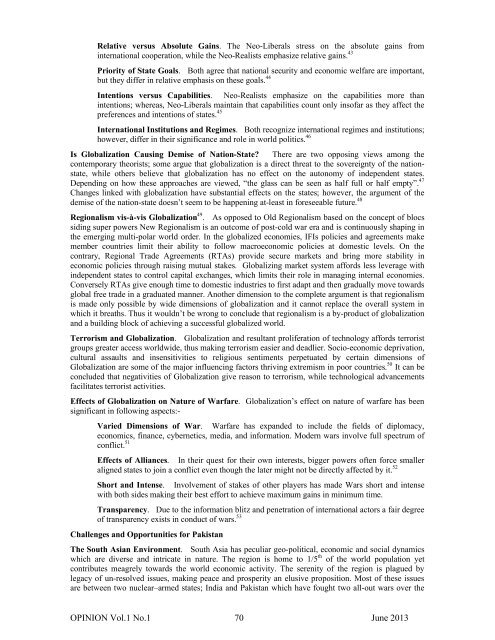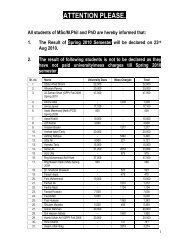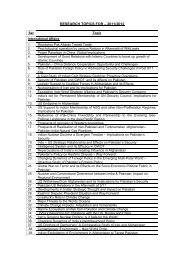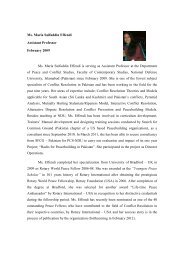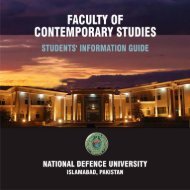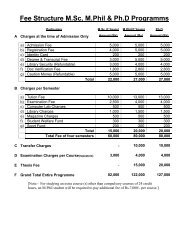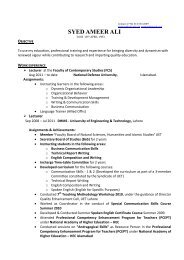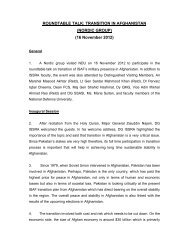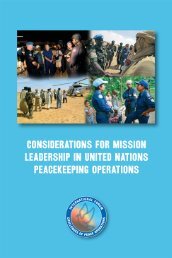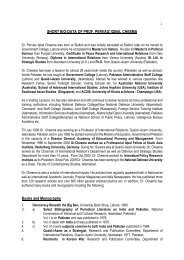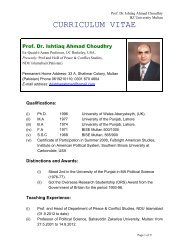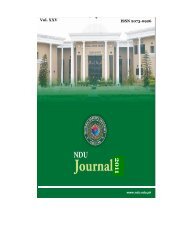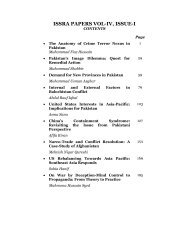OPINION Vol.1, No.1 June 2013 - National Defence University
OPINION Vol.1, No.1 June 2013 - National Defence University
OPINION Vol.1, No.1 June 2013 - National Defence University
Create successful ePaper yourself
Turn your PDF publications into a flip-book with our unique Google optimized e-Paper software.
Relative versus Absolute Gains. The Neo-Liberals stress on the absolute gains from<br />
international cooperation, while the Neo-Realists emphasize relative gains. 43<br />
Priority of State Goals. Both agree that national security and economic welfare are important,<br />
but they differ in relative emphasis on these goals. 44<br />
Intentions versus Capabilities. Neo-Realists emphasize on the capabilities more than<br />
intentions; whereas, Neo-Liberals maintain that capabilities count only insofar as they affect the<br />
preferences and intentions of states. 45<br />
International Institutions and Regimes. Both recognize international regimes and institutions;<br />
however, differ in their significance and role in world politics. 46<br />
Is Globalization Causing Demise of Nation-State There are two opposing views among the<br />
contemporary theorists; some argue that globalization is a direct threat to the sovereignty of the nationstate,<br />
while others believe that globalization has no effect on the autonomy of independent states.<br />
Depending on how these approaches are viewed, “the glass can be seen as half full or half empty”. 47<br />
Changes linked with globalization have substantial effects on the states; however, the argument of the<br />
demise of the nation-state doesn’t seem to be happening at-least in foreseeable future. 48<br />
Regionalism vis-à-vis Globalization 49 . As opposed to Old Regionalism based on the concept of blocs<br />
siding super powers New Regionalism is an outcome of post-cold war era and is continuously shaping in<br />
the emerging multi-polar world order. In the globalized economies, IFIs policies and agreements make<br />
member countries limit their ability to follow macroeconomic policies at domestic levels. On the<br />
contrary, Regional Trade Agreements (RTAs) provide secure markets and bring more stability in<br />
economic policies through raising mutual stakes. Globalizing market system affords less leverage with<br />
independent states to control capital exchanges, which limits their role in managing internal economies.<br />
Conversely RTAs give enough time to domestic industries to first adapt and then gradually move towards<br />
global free trade in a graduated manner. Another dimension to the complete argument is that regionalism<br />
is made only possible by wide dimensions of globalization and it cannot replace the overall system in<br />
which it breaths. Thus it wouldn’t be wrong to conclude that regionalism is a by-product of globalization<br />
and a building block of achieving a successful globalized world.<br />
Terrorism and Globalization. Globalization and resultant proliferation of technology affords terrorist<br />
groups greater access worldwide, thus making terrorism easier and deadlier. Socio-economic deprivation,<br />
cultural assaults and insensitivities to religious sentiments perpetuated by certain dimensions of<br />
Globalization are some of the major influencing factors thriving extremism in poor countries. 50 It can be<br />
concluded that negativities of Globalization give reason to terrorism, while technological advancements<br />
facilitates terrorist activities.<br />
Effects of Globalization on Nature of Warfare. Globalization’s effect on nature of warfare has been<br />
significant in following aspects:-<br />
Varied Dimensions of War. Warfare has expanded to include the fields of diplomacy,<br />
economics, finance, cybernetics, media, and information. Modern wars involve full spectrum of<br />
conflict. 51<br />
Effects of Alliances. In their quest for their own interests, bigger powers often force smaller<br />
aligned states to join a conflict even though the later might not be directly affected by it. 52<br />
Short and Intense. Involvement of stakes of other players has made Wars short and intense<br />
with both sides making their best effort to achieve maximum gains in minimum time.<br />
Transparency. Due to the information blitz and penetration of international actors a fair degree<br />
of transparency exists in conduct of wars. 53<br />
Challenges and Opportunities for Pakistan<br />
The South Asian Environment. South Asia has peculiar geo-political, economic and social dynamics<br />
which are diverse and intricate in nature. The region is home to 1/5 th of the world population yet<br />
contributes meagrely towards the world economic activity. The serenity of the region is plagued by<br />
legacy of un-resolved issues, making peace and prosperity an elusive proposition. Most of these issues<br />
are between two nuclear–armed states; India and Pakistan which have fought two all-out wars over the<br />
<strong>OPINION</strong> <strong>Vol.1</strong> <strong>No.1</strong> 70 <strong>June</strong> <strong>2013</strong>


